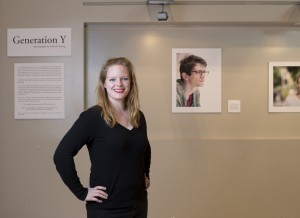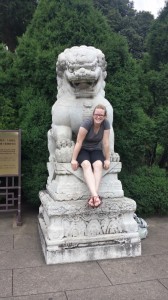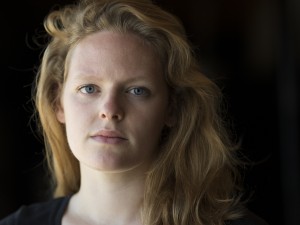
Michele Doying lifted the 24-by-18-inch photo of a Chinese man, taken in the kitchen where he works, and hung it against the blank wall. A white cardboard plaque next to the photo gave the man’s age, country of origin, and answers to these questions: “Do you like your government — why or why not? If you could change anything about your government, what would it be and why?”
The photo was part of the visual arts and photography student’s Bachelor of Fine Arts project, titled Generation Y, which was on display in the Harris Fine Arts Center’s main lobby during a few weeks in October. Doying interviewed and photographed young adults in Mainland China and the United States, asking them how they felt about their countries’ government.
Doying served a mission for the Church of Jesus Christ of Latter-day Saints in England, speaking Mandarin. She said she served many mainland Chinese people.
“I heard them say, ‘I’m going to go back home and make changes,’” Doying said. “My first thought was, ‘Oh they’re going to get rid of communism. They’re going to become a democracy.’”
Doying returned to BYU in Fall 2013 and got accepted into the fine arts program. She participated in a cultural exchange in China through American Education Elite in Summer 2014, where she reunited with a Chinese girl she met on her mission. This gave Doying the opportunity to learn just what her friend would change about China.
Doying said her friend’s answer — “education” — surprised her.
“As she’s talking, I remember being like, ‘This is not what I was expecting,’” Doying said. “Since that answer, I’ve just been thinking how we don’t know much about other countries and we can’t judge their lifestyle off of what American reporters are saying.”
That conversation opened Doying’s mind to consider alternative answers Chinese citizens might give if asked about their government.
The memory of that conversation returned last Winter Semester when Doying brainstormed what to do for her BFA project. Her friend’s answer and her love for learning about a person in a photograph inspired the idea that became Generation Y.
Linsey Ybarra worked in the dark room while Doying took a dark room photography class last Winter Semester. Ybarra said when Doying mentioned her project idea, Doying was conflicted about it.
“She’s done some intricate stuff,” Ybarra said of Doying. “She worried it would be too simple. I just told her that I don’t think she needed to worry about it too much. I never had any doubt that she could pull it off. She puts so much detail and thought into her work. That’s what makes a project and image so great. I encouraged her to not give up because I thought she could do a great job.”
Doying titled her project Generation Y because she solely interviewed those born between 1980 and 2000. She said she wanted to keep her project in a certain spectrum.
“I was mostly interested in focusing on millennials because that’s my age group,” Doying said. “We’ve experienced similar world events or life events at the same time. I think it would be fascinating to focus on the older generations because they’ve been through so much whereas we haven’t, but our voice is still important too. I want to see what we’re focusing on now with that lack of experience.”

Doying shot the photographs last summer. She returned to China, where she spent her weekdays working as a personal teacher for a Chinese family and her free weekends commuting to different cities for her project, visiting nine cities total.
She had a contact in each city she visited. Helena He, who met Doying through BYU, was Doying’s local coordinator when Doying traveled to He’s hometown of Guangzhou.
“When I heard she was going to China for her project, I told her to come to my city,” said He. She accompanied Doying around the city, connecting her with people He already knew. A couple of He’s friends also helped.
Doying had her interviewees write their answers on the back of a model release form. She gave them the option to be anonymous, in which case she photographed the back of their head or showed them as silhouettes.
“I showed the pictures to them and if they didn’t like it because it showed too much of their face I deleted it with them right there,” Doying said.
Two friends helped her translate the answers when she got back to the U.S. because she did not understand all the Chinese characters. One friend translated the Chinese; another translated the Chinese into English; the other double-checked the translation and changed grammar or words translated too literally.
Three friends helped her translate the answers when she got back to the U.S. because she did not understand all the Chinese characters. One friend changed the Chinese so it would be translated into English better; another translated the Chinese into English; another double-checked the translation and changed grammar or words translated too literally.
Doying also interviewed young adults in Washington D.C., New York, California and Connecticut.
“As the project developed, I became interested in what Americans thought about their own government because I’m not a very government-minded person,” Doying said. “I think politics are interesting but I often don’t understand a lot of what they’re fighting about so I don’t get as involved as I probably should.”
What fascinated Doying was how many Chinese said they loved their government and the one party system, whereas many Americans said they disliked their government. She also noticed two trends among all the millennials: a desire for transparency and to improve the education system.
“I’ve always liked learning,” Doying said. “Through this project, I’ve learned about issues that I never would have thought of. I have begun to formulate my own opinions.”

She wanted her project to spark thought in those she interviewed and those who viewed her BFA exhibit. Doying said she thought, “Yes, mission accomplished!” when one of the Chinese men she interviewed said her question inspired him to think about China’s government.
Ybarra attributed Doying’s project’s success to Doying’s nonjudgmental and open-hearted personality.
“She can talk with anyone,” Ybarra said. “She has a genuine interest in getting to know people; so she’s able to really listen to them (and) start from a clean slate.”
Doying had two blank notebooks at her BFA reception on Oct. 7 so viewers could write their own answers to the questions “Do you like your government — why or why not?” and “If you could change anything about your government, what would it be and why?” She said she plans to continue her project after she graduates.




